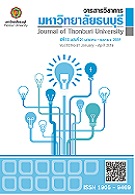ปัจจัยที่มีผลกระทบต่อปริมาณเงินของประเทศไทย
Keywords:
ผลกระทบ, ปริมาณเงิน, Affecting, Money SupplyAbstract
ในการวิจัยครั้งนี้จึงมีวัตถุประสงค์เพื่อศึกษาถึงปัจจัยต่างๆ ที่มีผลกระทบต่อปริมาณเงินของประเทศไทย ระหว่างปี พ.ศ. 2530 ถึง 2544 ทั้งนี้เพื่อใช้เป็นประโยชน์ในการควบคุมปริมาณเงินให้มีจำนวนที่เหมาะสมกับความมีเสถียรภาพทางเศรษฐกิจ และเพื่อศึกษาถึงแบบจำลองต่างๆ ซึ่งสามารถนำไปใช้ประโยชน์ในการพยากรณ์ค่าตัวแปรตามต่อไป
วิธีการวิเคราะห์ข้อมูลจะใช้วิธีการวิเคราะห์สมการการถดถอย (Regression) มาทำการประมาณค่าพารามิเตอร์ (Parameters) ของตัวแปรอิสระต่างๆ ด้วยวิธีกำลังสองน้อยที่สุด (Ordinary Least Square : OLS) ประมวลผลข้อมูลด้วยคอมพิวเตอร์ส่วนบุคคล (Personal Computer) โดยใช้โปรแกรมสำเร็จรูป จากนั้นทำการทดสอบค่าสถิติต่างๆ
ผลการศึกษาสรุปได้ดังนี้
1. การเปลี่ยนแปลงของปริมาณเงินทุนสำรองเงินตราต่างประเทศ มีผลต่อการเปลี่ยนแปลงของปริมาณธนบัตรและเหรียญกษาปณ์ที่ถือในมือประชาชนในทิศทางเดียวกัน ส่วนสินเชื่อสุทธิในภาครัฐบาล พบว่าไม่มีผลต่อการเปลี่ยนแปลงของปริมาณธนบัตรและเหรียญกษาปณ์ที่ถือในมือประชาชน
2. การเปลี่ยนแปลงของปริมาณธนบัตรและเหรียญกษาปณ์ที่ถือในมือประชาชน และอัตราการเพิ่มของผลิตภัณฑ์ประชาชาติ มีผลต่อการเปลี่ยนแปลงของปริมาณเงินฝากเผื่อเรียกที่ถือในมือประชาชนในทิศทางเดียวกัน
3. การเปลี่ยนแปลงของดุลการชำระเงิน ไม่มีผลต่อการเปลี่ยนแปลงของสินทรัพย์ต่างประเทศสุทธิ
4. การเปลี่ยนแปลงของรายได้ของรัฐบาล มีผลต่อการเปลี่ยนแปลงของสินเชื่อสุทธิในภาครัฐบาลในทิศทางตรงกันข้ามส่วนการเปลี่ยนแปลงของรายจ่ายของรัฐบาล มีผลต่อการเปลี่ยนแปลงของสินเชื่อสุทธิในภาครัฐบาลในทิศทางเดียวกัน
5. การเปลี่ยนแปลงของอัตราดอกเบี้ยเงินให้สินเชื่อ มีผลต่อการเปลี่ยนแปลงของสินเชื่อที่ให้แก่ภาคเอกชนสุทธิในทิศทางตรงกันข้าม ส่วนการเปลี่ยนแปลงของเงินฝากในระบบธนาคารพาณิชย์ มีผลต่อการเปลี่ยนแปลงของสินเชื่อที่ให้แก่ภาคเอกชนสุทธิในทิศทางเดียวกัน
FACTORS AFFECTING MONEY SUPPLY IN THAILAND
This research project is a study of the various factors that have affected the money supply in Thailand during the period from 1987 to 2001. The research was conducted in order to benefit the control of appropriate quantities of the money supply to maintain economic stability and to study various models that forecast future dependent values.
The analytical methodology employed was a Regression analysis. It was used in order to provide appropriate parameters for various independent values according to the Ordinary Least Square (OLS). The evaluation of the resulting data was performed on a personal computer using program. Finally, the various statistical data were tested.
The results of the study are summarized below:
1. Revealed that changes in the Foreign Exchange Reserve had effects on the quantities of currency carried by the people in a similar manner - that is, when the Reserve went up, the currency carried by the people also increased. Whereas, the net claim on government funds had no effect on the change in currency carried by the people.
2. Revealed that changes in the quantities of currency carried by the people and the increasing rates of the gross national product had similar effects on changes in the quantities of the demand deposits carried by people.
3. Revealed that changes in the balance of payments had no effect on changes in the net foreign assets.
4. Revealed that changes in the government income had a reverse effect on changes in the net claim on government funds – that is, when claims increased, the government income decreased. However, changes in government expenditures had corresponding effects on changes in the “net claims on the government model”.
5. Revealed that changes of loan interest rates had converse effects on the “net claim on the private sector”. However, changes of deposits in the commercial banking system had corresponding effects on changes in the net claims on the private sector.







